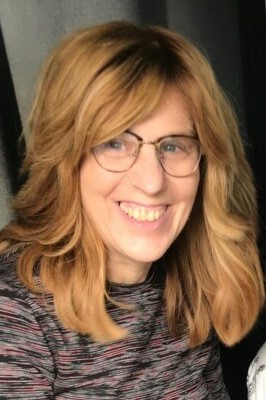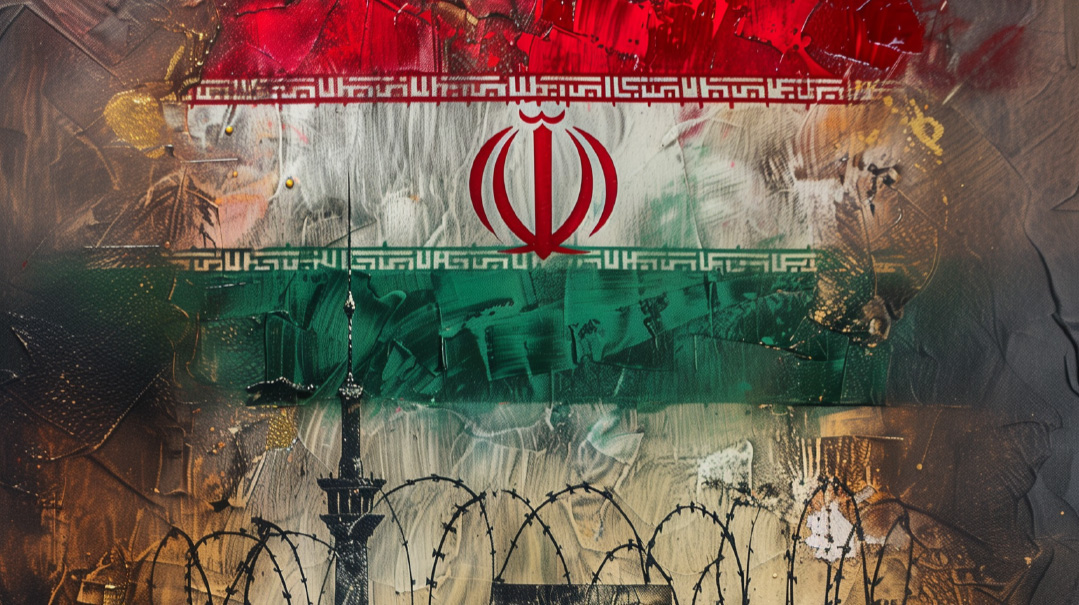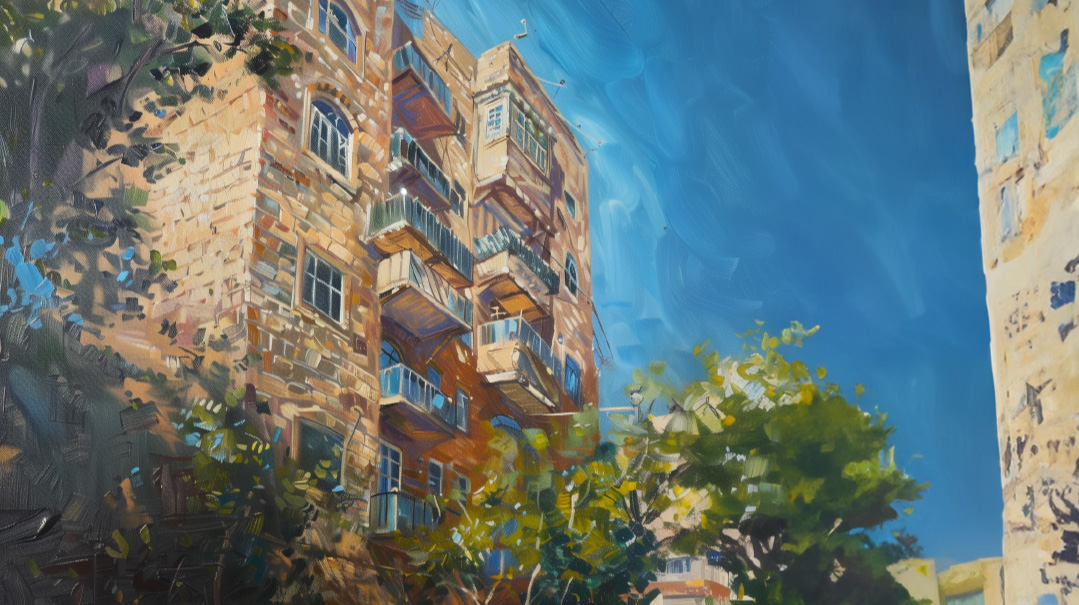A Future

I knew there was no future for me as a Jew or as a woman in Iran

As told to Malkie Schulman
I
was in college in Iran when the Islamic Revolution was in its beginning stages. My fellow classmates were busy with protests against the Shah, but I stayed away. Aside from the fact that the Shah was very good to the Jews, my mother had always warned me, “Maryam, don’t get involved. You’re Jewish. Stay out of politics.” So I went to classes and then came straight home. After I graduated, the situation got worse. I knew there was no future for me as a Jew or as a woman in Iran. I had won a scholarship to Harvard, and my husband of a few months and I decided it would be a good idea to leave for America.
IN August of 1979, five months after the revolution started, we arrived at JFK and went straight to my brother and sister-in-law’s house. They had been living in New York for a few years already. I recall my first Shabbat in America, seeing men and women sitting together without a mechitzah. What is this? I asked myself in shock.
On Yom Kippur, I saw my sister-in-law looking for something. “What are you looking for?” I asked.
“It’s Yom Kippur,” she answered. “I’m looking for the keys so we can go to shul.”
“No, thanks,” I said. “I’m walking.”
After that, my husband and I knew we had to leave my brother’s house. It was disturbing to see how they and other Iranian friends and family left their religion behind when they came to America.
Although we weren’t completely observant in Iran, we were very traditional. We celebrated all the holidays and kept Shabbat for the most part. When we first married, my husband and I made a commitment to be fully religious, especially around observing Shabbat.
It was only two months since we’d emigrated from Iran. Now we needed to find a place to live.
We’d come to the United States with my Harvard scholarship in hand, and I was meant to start school in the fall of 1980. But by then, I’d found out I was expecting. My husband and I agreed that being in a high-pressured university environment while trying to raise a child was not going to work. The whole idea was overwhelming because we were in a foreign country with no money (it was during the revolution and no money was allowed to leave the country) and no family support. We both needed jobs.
My husband had lived with a shomer Shabbat American family in West Orange, New Jersey while he was in school. Now, they welcomed us into their home until we were able to rent our own apartment three months later.
WE settled in Elizabeth, New Jersey, and baruch Hashem, my husband and I were both able to find jobs. I had a degree from Iran in engineering, and I began doing urban planning. The hours were long, and too hard to keep up while I was expecting. My husband pushed me to quit, but we still needed the money. Eventually, my parents found a “dealer” who would deposit money in my American bank account, so with their generous support from Iran, I took a course at a beauty school and eventually became a cosmetician. Baruch Hashem, I was successful in that field for many years.
Going to beauty school was not easy. My (non-Jewish) classmates would taunt me, saying, “Here comes Khomeini” whenever I’d walk into the classroom. Our arrival in the States coincided with Iranian students storming the American embassy and detaining more than 50 hostages, so there was a lot of anti-Iranian sentiment. In Los Angeles, Iranian merchants were beaten up and their stores forced to close down. It was embarrassing and humiliating for me, and I was lonely. I kept a low profile after that. When people would ask me where I was from, I would say, “Persia.” I was too scared to say Iran, and most people had no idea that Iran was Persia. They’d ask me where Persia was. I’d say, “Oh, somewhere in the Middle East.”
Although I had a wonderful husband, it was very difficult being in a strange country without my parents and other family members. I missed my parents so much. In Iran, families are very close. We do everything together. That was also a source of culture shock; on Shabbat, the children didn’t always sit together at the table. Married children lived far away from their parents. In Shiraz, we all lived close by, and we were always visiting each other.
Another challenge was the relationship between the younger and older generations. I remember the first time my child had a friend over. The little boy went straight to my fridge and opened it up to see what there was to eat. An Iranian would never do that. And not because their hosts are not hospitable, but because there’s more respect in Iran than in America.
One time when my daughter went to her friend’s house, I told her not to forget to say please and thank you to her hosts and to call her friend’s parents Mr. or Mrs., not by their first names. When she came home after her play date, she told me that she’d said, “Hello, Mrs. Schwartz,” to her friend’s mother. The mother said to her, “Why are you calling me Mrs. Schwartz? Call me Judy.” These were all shocks to me.
IN our beginning years in the United States, it took effort to remain strong in our commitment to being shomer Shabbat. We had to really keep to ourselves because all the people we knew were trying to assimilate into American culture. That meant not going out and socializing with family and friends because we knew it could easily lead to eating non-kosher food. One time we visited my cousins in Florida, and we saw they were mixing meat and milk. They even had ham! I said to my husband, “Let’s go to a hotel. We can’t stay here.” It was shocking to me that these Jews who left Iran because of religious persecution weren’t even bothering to keep their tradition.
My husband was strong in his religious conviction. A few years after we came to America, we’d saved enough money to buy a house. When I started looking around in different neighborhoods, my husband said to me, “If the house is more than a half-mile walking distance to a shul, then don’t bother looking at it.”
Once Khomeini took over, our relatives in Iran were begging us to take in their kids, whom they were trying to get out of the country. There were no more flights to the US, so they had to smuggle their children out. We did whatever we could to help. My siblings and my husband’s siblings smuggled their children through Pakistan, and from there they were taken to Austria, where various Jewish organizations sent us paperwork that would prove we were offering our homes and were willing to support the children.
It took a year from when they left Iranian soil until they finally arrived in our house in 1987. Baruch Hashem, between my husband’s successful clothing business and my skin care salon, we were financially stable by then. During the year we were waiting for our family, we bought a larger home in order to accommodate everyone. Still, with four additional people ranging in ages from 12 to 26, plus two more children who lived at other relatives but stayed with us often for Shabbat, there was still not enough room. Our three children moved into our bedroom with us, and we gave their bedrooms to their cousins. For the next few years, we essentially became parents to our nephews and nieces. Whatever each one needed, we did for them, whether it was sending them to school, to work, or marrying them off. For those first years, it was like Grand Central Station in our house. Everybody was welcome.
Eventually, the time came when my siblings were able to make plans to emigrate to the US. We sold our original, small house (which we’d been renting out) to my sister, and her grown children moved into it until she and my brother-in-law arrived.
After this first crew left, my husband’s brother and sister and their children came to America. They also lived with us until they found a place of their own. That is, we found apartments for them, paid the initial rent, and bought furniture. We were happy to do it. Hashem helped us, and we helped them. That’s how we looked at it. Today, whenever we have a family get-together, our relatives mention me and my husband and thank us. Baruch Hashem, many of these children are not only successful financially, but are bnei Torah living in Monsey, Lakewood, and Brooklyn. We are all still very close.
Eleven years after we moved to America, my husband got sick. Six months later, he passed away, leaving me with three young children, the oldest age eight. That was a tough time for me emotionally, of course, but also financially. Though our relatives were no longer living with us, I still had a big mortgage on our house. A year later, my parents emigrated to America and moved in with me. They were a big help to me in raising my children. Three years later, I married my second husband, and my parents continued to live with us for another few years.
My journey from Iran to America wasn’t easy. Building a new life in a culture so different from what I was used to without family support was challenging. But today, I am grateful to Hashem for where I am and where my children are. Baruch Hashem, they have followed in their parents’ footsteps. They’re amazing: frum, hospitable, respectful, and generous proud Jews.
One of my daughters recently made aliyah with her husband and large family. When she left, she said, “I’m sorry that I’m leaving you, Mommy.”
I told her, “To make aliyah, that’s not leaving me. That’s how I raised you.”
(Originally featured in Family First, Issue 890)
Oops! We could not locate your form.




